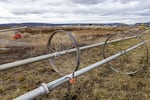Across rural Oregon, state and federal laws don’t protect clean drinking water. That’s because these safeguards exclude private domestic wells, with consequences that were highlighted by U.S. Sen. Jeff Merkley last week at a congressional hearing on infrastructure spending.
At Thursday’s hearing of the U.S. Senate Committee on the Environment and Public Works, the senator pointed to OPB’s reporting on two regions: In Eastern Oregon where more than 4,000 wells are at risk from decades of nitrate pollution by agricultural interests, and in Central Oregon, where dozens of people blame a gravel mine for sudden plumbing disasters and health concerns.

Farmer Dick Zimmerlee collected two bottles of water from his toilet tank in Crook County, Oregon on May 1, 2023. Water in his toilet bowl looks perfectly clear, as does what runs from his taps. Only after the water stands and is exposed to air do fine black particles reveal themselves.
Emily Cureton Cook / OPB
“They can’t sell their homes. They’re afraid to raise their children, but they can’t afford to move,” Merkley said. “It seems to me like these are exactly the sorts of things that we’re trying to provide funds for, and the [Drinking Water and Wastewater Infrastructure Act] to assist, and I want us to find a way to help these communities out.”
By and large, rural well owners don’t benefit from federal infrastructure investments reserved for public water systems. That’s as roughly one quarter of Oregonians get their drinking water from private wells, which aren’t regulated by the state. Homeowners are responsible for their own testing to rule out contamination.
That dynamic has lately been shifting in Morrow and Umatilla counties, where the longstanding and wide-reaching dangers of nitrate pollution gained the attention of state and federal leaders, who are now promising millions to pay for comprehensive outreach, testing and alternative water supplies.
In Crook County, however, a smaller contingent of residents are on their own to try and identify the source of high manganese levels in the well water. Depending on the concentration, this metal can cause a range of problems, from stained laundry to liver issues and neurological dysfunction.
Earlier this year, Oregon regulators dismissed Crook County residents’ complaints against the surface mining giant Knife River Corporation Northwest. Over the summer, Merkley and his fellow Democratic Sen. Ron Wyden urged the Environmental Protection Agency to investigate the state’s conclusion.

U.S. Sen. Jeff Merkley and rural Boardman resident Ana Maria Rodriguez go over a letter regarding nitrate pollution in Morrow and Umatilla counties on Jan. 20, 2023.
Antonio Sierra / OPB
But, the EPA refused, saying its “drinking water oversight is limited in this case, because private wells are not regulated under the [federal] Safe Drinking Water Act,” according to a June 29 letter to the senators from the agency’s regional administrator, Casey Sixkiller.
Crook County residents have since paid a private consultant to plan water sampling.
Recent emails show that consultant, Jim Newton, asked Knife River for access to water sources on the mining site, but the company refused.
“We will cooperate with the appropriate agencies as directed but will not be allowing direct access for interested private parties at this time,” Knife River’s Matt Ropp wrote to Newton in a Sept. 1 email.
In a follow-up statement to OPB, Ropp said Oregon regulators “have clearly stated that our operations are not causing any changes in the level of manganese in the groundwater.”
Oregon’s mining regulator, the Department of Geology and Mineral Industries, said it will negotiate access if the residents can offer a better sampling plan.
“DOGAMI has made it clear that we will help secure access should [the residents] not be able to do so. However, both access and help are contingent on their ability to produce a detailed water sampling plan,” DOGAMI spokesperson Alex Lopez said in a statement.




